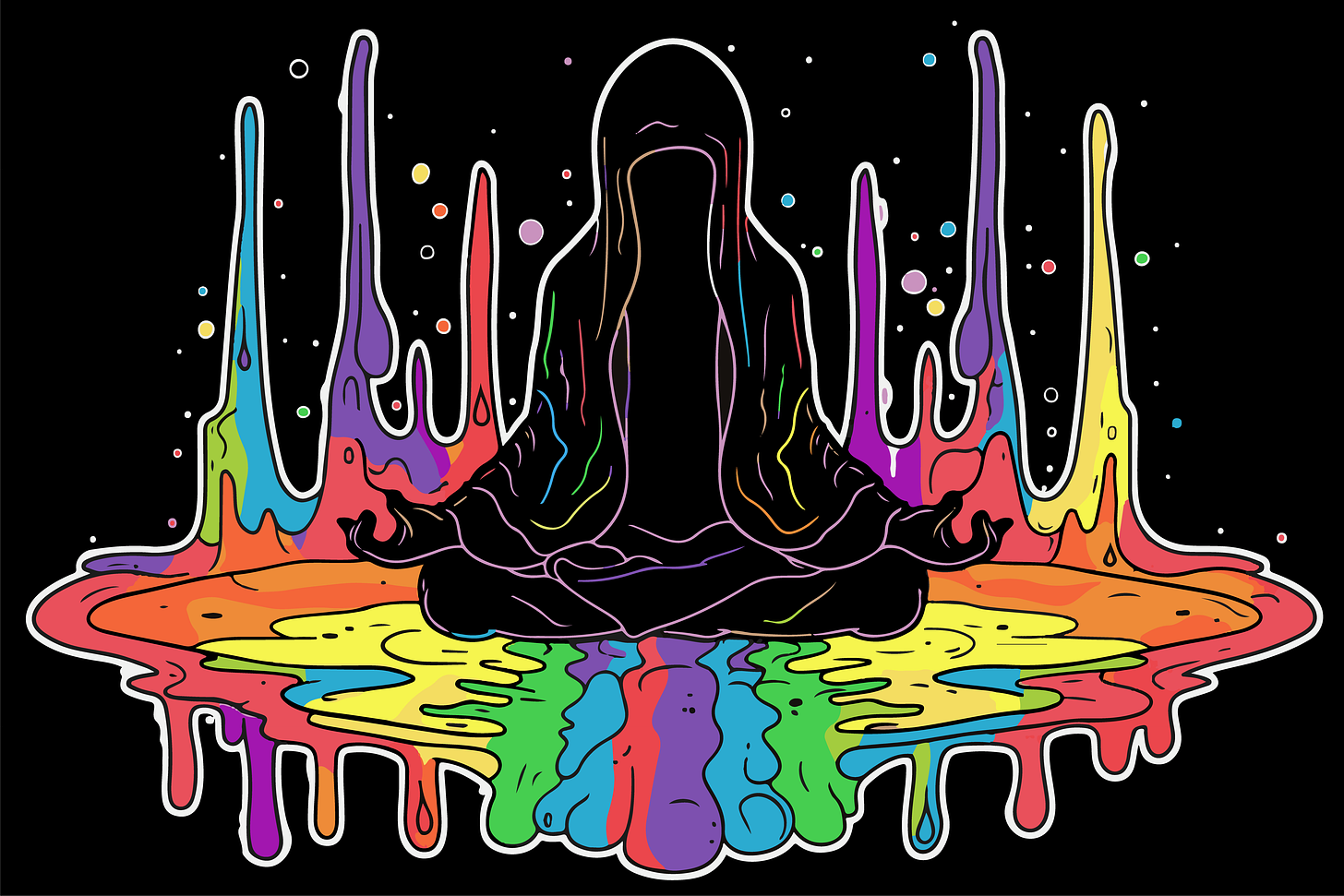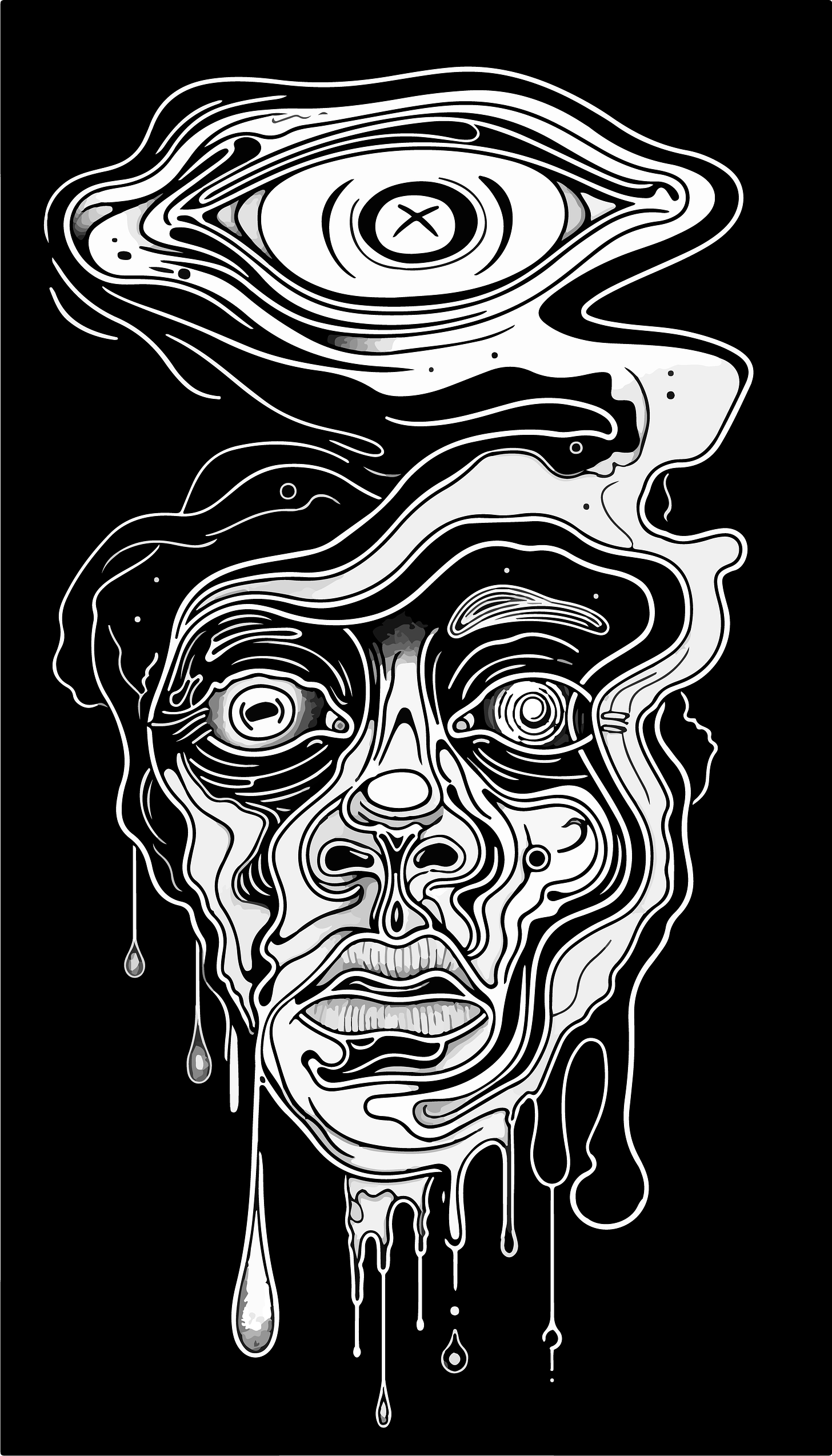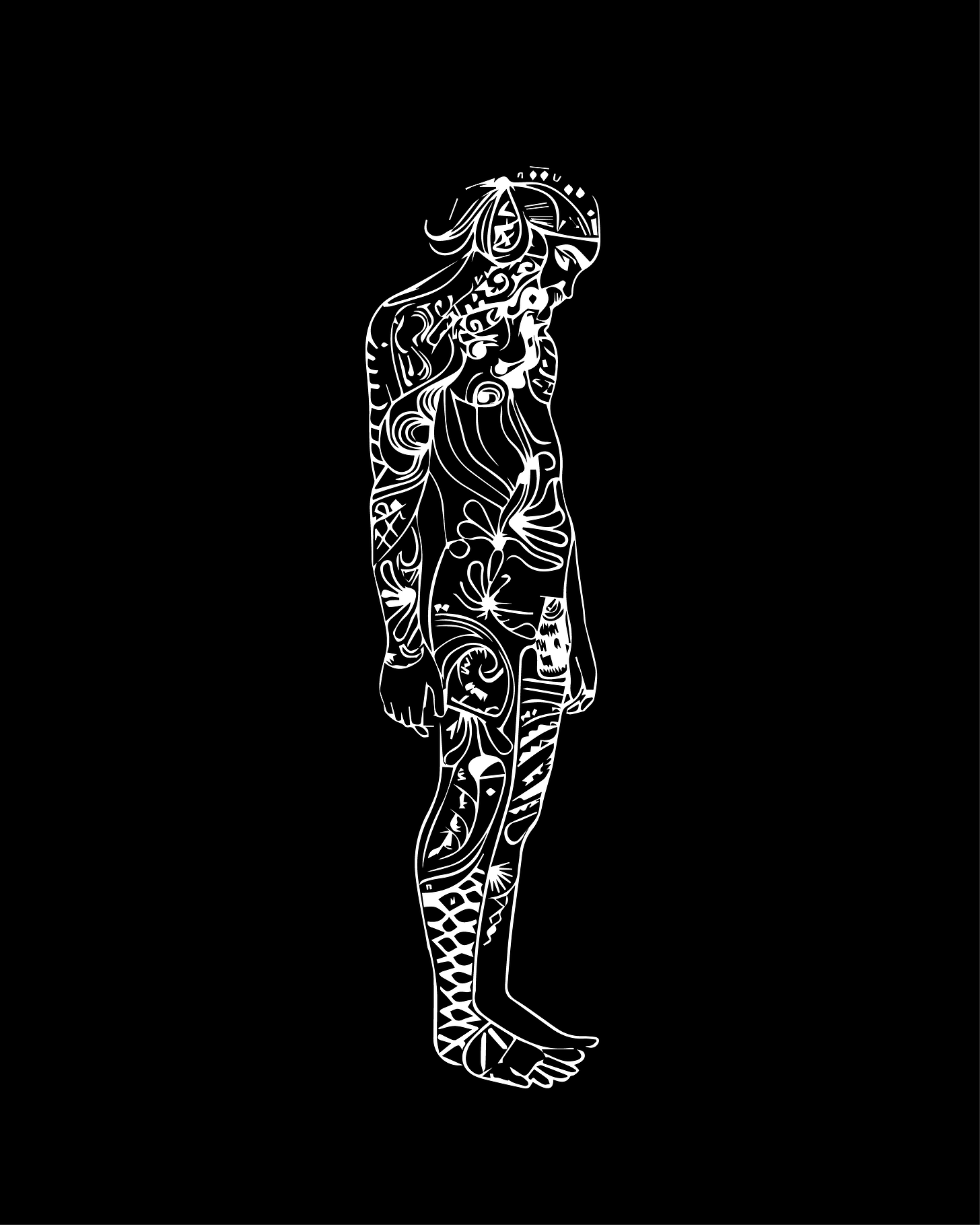The Oldest Quest: Death in Early Myth and Philosophy
The Pursuit of Immortality: Chapter 1 (of 8)
Caveat: this post discusses topics that some people may find distressing or even disturbing including death and suicide. Use your best judgment before reading; if necessary, save this post for a time when you’re in the proper frame of mind.
No longer mourn for me when I am dead
Than you shall hear the surly sullen bell
Give warning to the world that I am fled
From this vile world with vilest worms to dwell
— William Shakespeare
I WAS MELTING INTO A COUCH in a smoky two-car garage in northern Kentucky listening to a total stranger talk about how he was thoroughly convinced that he couldn’t die. It was October 2013, and it’d been about an hour since I ate several tabs of acid.
I was starting to feel the effects.
“It hasn’t happened yet, and I have no reason to believe it ever will.”
The speaker, who I’ll call Mitch, reclined in a sagging blue lawn chair and looked to me like the embodiment of a modern hippy—dark brown hair shoulder length and dirty, with the soiled hands of an auto mechanic; he wore a faded Tool 10,000 Days tour shirt and baggy camouflage cargo shorts. He had a stringy mustache that curled over his upper lip but his cheeks stubbornly refused to grow a beard. He was barefoot. He held a sweaty can of Bud Light in one hand and an unlit Turkish Royal in the other; these he gestured with as he spoke.
“Short of pulling out a gun and shooting me right now, there’s nothing you can say or do to convince me that I’ll die.” At this, he put the cigarette between his lips, cracked a Bic lighter, and inhaled deeply. After exhaling a small cloud into the center of the room, he laughed and said, “But you’re not gonna do that. And the fact that you won’t only proves my point.”
Needless to say, I wasn’t in the right headspace for this discussion. Luckily, I wasn’t the only one present. To my right sat a lanky guy, late twenties, dressed like a Sunday school teacher. He wasn’t drinking, but reeked of dank weed when he spoke. His voice was high and nasally. “So, what about everyone else who has died?” he said. “Surely you personally know someone who has died.”
“Yeah, of course I do,” Mitch replied. “I saw people die in Afghanistan. Plenty of ‘em.” He laughed again—it was a nice sound, I decided. His eyes disappeared when he smiled and I thought he would look at home on horseback, riding swiftly across the rolling green hills of Karakorum.
“So then… you do believe in death,” said the Sunday school teacher, whose name I’ve long since forgotten. The way he said it made it sound conspiratorial—as if believing in Death was like believing in Santa Claus or UFOs or that Elvis was still prancing around Graceland in his underwear belting Hound Dog into a jewel-encrusted microphone.
“Look, I’m not arguing that death isn’t real. Just that I have no objective reason to believe it’s gonna happen to me.” Mitch took another drag off his cigarette, then continued: “There are infinite versions of me out there dying all the time. I leave the house and get into a car crash. I get diagnosed with cancer. I cut my wrists in the bathtub. Every time I die, the path splits. That version of me, the one that died, stops existing. A bunch of other versions of me live on to die in other ways. But that still means one version will keep going on forever. There will always be an unbroken thread.”
“Yeah, but… how can you be sure you are the thread that never gets broken?”
“‘Cuz I’m the one consciously experiencing everything. I’m in the driver’s seat.”
Someone to my left unceremoniously lit a joint, and it soon began circumambulating. A noisy doom metal drone escaped from unseen speakers somewhere on the other side of a mostly disassembled Harley-Davidson Sportster. Meanwhile, I was enthusiastically exploring the hidden dimensions of the threadbare sofa with my fingertips. The fibers felt simultaneously alive and not-alive. At once I understood: this was Schrödinger's couch. I had passed the first gate. I was entering The Quantum Realms.
This was my cosmic ferry.
Eventually, I returned to my earthly body and was disappointed to discover the couch was just a poorly upholstered relic of the Clinton administration. The conversation stuck with me, though, despite my psychospiritual rambling. It’s an earworm that has lived rent free in my head in the decade since. I still have trouble analyzing, interpreting, and making sense of it. On some level, I do see Mitch’s point: death will never be “real” to any of us… that is, until we’re dead. Until that precise moment, death will only ever be a mirage.1 On the other hand, to deny that death will ever come for you seems naïve at best and pernicious at worst. Then again, I’m the kind of person who likes to be prepared for every eventuality.
As humans, we all share this one dark and undeniable truth: someday we will die. This simple fact ignites a flurry of emotions—from rage to grief and even denial. Most of us have experienced the sorrow of losing a friend or loved one. Given enough time, everyone will know this pain. As we grapple with the tragic implications of our own mortality (and the mortality of those around us), we naturally turn towards philosophical and spiritual pursuits for answers. These pursuits have, over millennia, given birth to a diverse tapestry of beliefs and traditions.
Mortality is the foundation upon which nearly all religions are built, and many doctrines promise everlasting life after death as reward for living justly or by faith. Regardless of age, nationality, education, employment, creed, race, or gender, the anxiety we feel about death is as universal as gravity or the motion of heavenly bodies. In his 1761 epistolary novel, La Nouvelle Héloïse, Jean-Jacques Rousseau writes:
He who pretends to look on death without fear lies.
That begs the question—why? Why do we fear death?
I think part of the answer lies in our biology. We’re programmed to survive. Death represents the ultimate failure of that evolutionary programming—it’s the end of the line. Our bodies scream at us to avoid it, just as they would warn us at the first signs of fire, severe weather, or lurking predators.
In "The Denial of Death," Ernest Becker argues that the deeply rooted fear of mortality is the primary driving force behind almost all of human behavior. Becker says: "The idea of death, the fear of it, haunts the human animal like nothing else; it is a mainspring of human activity—activity designed largely to avoid the fatality of death, to overcome it by denying in some way that it is the final destiny for man." In other words, this terror of our inevitable demise propels us to create meaning and seek symbolic immortality in an attempt to circumvent fate.
Our fear of death goes beyond pure instinct. As humans, we’re creatures who crave meaning and purpose. Death throws that very purpose into question. If our lives are finite, what does it all amount to? This existential angst adds another layer of dread to the equation. But the fear of death isn't always a crippling force. It can motivate us to live more fully, to cherish our loved ones, and to leave a lasting mark on the world. It's a reminder of the preciousness of time, urging us to make the most of our transient existence. Yet, the specter of death remains a constant companion on our journey through life.
This primal fear hasn't stopped humanity from trying to cheat Death’s icy grip. Our oldest myths and stories reveal a persistent yearning for immortality and a primeval preoccupation with death. One of the earliest and most captivating tales comes to us from Mesopotamia. It's the story of Gilgamesh, a powerful king who—upon confronting the mortality of his dearest friend, Enkidu—embarks on a desperate quest to unlock the secret of eternal life. In the Epic of Gilgamesh, we see the dawn of humanity's denial of death; a yearning for immortality which echoes through the corridors of our history.
The Epic of Gilgamesh isn't merely a quest for life beyond death; it's a meditation on the very nature of being. Gilgamesh's grief over the loss of Enkidu exposes the brutal truth—gods may be immortal, but men are destined for the grave. Anguished yet resolute, Gilgamesh refuses to accept this fate. His journey leads him to an immortal sage called Utnapishtim, the sole survivor of a cataclysmic flood sent by the gods to cleanse the world.2 But the revelation Gilgamesh finds isn't some mystical elixir. Instead, he learns the secret of immortality is… elusive.
The tale of Gilgamesh reminds us that the fear of death is intertwined with the fear of meaninglessness. True immortality might lie not in defying our biological end, but in the legacy we build through our deeds.3 After enduring many adventures, Gilgamesh is forced to confront his own mortality. The story ends after Gilgamesh's return to the city of Uruk, following his failed attempt to secure immortality.
This oldest of quests persisted well into the days of the Greek philosophers. In Plato's Phaedo, we witness the final hours of Socrates. Condemned to death, Socrates's composure contrasts sharply with the distress of his followers. Here, Plato explores the idea of the immortal soul. Socrates argues that our souls are eternal and indestructible, merely temporarily housed within our mortal bodies. Death, therefore, is a liberation—a singular moment in which the soul breaks free to finally achieve the insight of “pure knowledge.”
We also get a picture of the Greek milieu regarding death during the 4th century BCE. Plato declares (through the voice of Socrates) that suicide is unlawful and mortality is a perplexing enigma of imprisonment at the hands of the gods. Sleep is the opposite of waking, and so death is the opposite of life. The body, he says, is the source or vessel for many of life’s troubles: hunger, disease, and lust; fear, fancy, and foolery.4
“Whence come wars, and fightings, and factions? whence but from the body and the lusts of the body?”
—Plato, in Phaedo
Plato's framing of death shifts our focus from the physical to the metaphysical. In order to attain pure knowledge, we must quit our mortal coils. It's a seductive notion—we may die, but some essence of ourselves lives on and at last secures the divine wisdom denied us in life. This belief is echoed in many religions and offers solace in the face of our inevitable end.
Yet, mythology warns us that eternal life might not be the blessing we imagine. Consider the tale of Tithonus, beloved of the goddess Eos.5 She begs Zeus for her lover's immortality but forgets to ask for eternal youth. Tithonus is cursed to live forever, but ages into decrepitude, his voice reduced to a feeble insectile chirp. The moral of this tale is clear: immortality without vitality is torture.
It's important to note that not every ancient thinker believed in the soul's survival. Epicurus and his follower, the Roman poet Lucretius, argued that our bodies and souls are made of atoms, dispersing at death. This may sound bleak, yet Epicurus believed this understanding can free us from the terror of death. There is no punishment to fear, no afterlife, only the cessation of being. Once we grasp our finite nature, we can focus on maximizing joy in the present life.
The allure of immortality, the fear of mortality—these are threads woven through the fabric of human existence. Whether it's a heroic quest to uncover an earthly elixir, or the philosophical conviction of an eternal soul, humanity continues to dance with our grim specter. While Plato and thinkers influenced by him offer the possibility of an immortal spirit surviving the body's demise, the tragic tale of Tithonus echoes a chilling warning: perhaps there are fates worse than death. And then there are those like Epicurus, challenging us to abandon our desperate chase for eternal life and instead find joy and meaning within the precious, fleeting moments we have.
"Make yourself familiar with the belief that death is nothing to us, since everything good and bad lies in sensation, and death is to be deprived of sensation. …So that most fearful of all bad things, death, is nothing to us, since when we are, death is not, and when death is present, then we are not.."
— Epicurus, Letter to Menoeceus
The journey is far from over. Legends like Tithonus and philosophers like Plato may feel like relics of the distant past, yet the drive to transcend our mortal limits will echo powerfully as we delve into the medieval world. Alchemy, that esoteric blend of science, mysticism, and the desperate pursuit of the Philosopher's Stone, will be our next stop. Is it mere folly, or does it hint at another facet of our timeless quest—one driven as much by the desire for earthly power and wealth as by the haunting fear of oblivion?
Part 2 of this series is coming soon. If you’d like to be notified when it comes out, subscribe to Arcalogica by clicking the button at the bottom of the page. Your support makes it possible for me to continue my journey into obscurity as I reflect on the very things that make us human.
Thanks so much for reading. As always, stay curious.
REFERENCES
Mitchell, Stephen. Gilgamesh: A New English Version. Free Press, 2006.
Plato, and Benjamin Jowett. Phaedo. Liaoning Ren Min Chu Ban She, 2015.
George, Andrew & Al-Rawi, F.. Tablets from the Sippar Library VI. Atra-ḫasīs (58, 147-190), 1996.
Professor Dame Sue Black. ALL THAT REMAINS : A Life in Death. Arcade Publishing, 2019.
Becker, Ernest. The Denial of Death. Souvenir Press, , Cop, 1973.
The Homeric Hymns and Homerica with an English Translation by Hugh G. Evelyn-White. Homeric Hymns. Cambridge, MA., Harvard University Press; London, William Heinemann Ltd. 1914.
Ovid. Metamorphoses. Translated by David Raeburn, Penguin UK, 2004.
Gibran, Kahlil. “The Prophet by Kahlil Gibran.” www.gutenberg.org, 2019, www.gutenberg.org/files/58585/58585-h/58585-h.htm#link90.
Luper, Steven. “Death (Stanford Encyclopedia of Philosophy).” Stanford.edu, 2019, plato.stanford.edu/entries/death/.
FOOTNOTES
By the way, there’s no universal definition of death. While the cessation of biological functions is a common criteria, the specific details can vary. Medically, brain death is often used as a determining factor, while others emphasize the irreversible end of circulatory and respiratory systems. The ongoing development of medical technology further complicates the issue. Therefore, the precise moment of death can be a complex question with legal, medical, and ethical considerations. In her memoir All That Remains, forensic anthropologist and anatomist Sue Black says this about the body: “Remarkably, only five organs are considered vital to sustained life: the heart, brain, lungs, kidneys, and liver.” She continues: “According to one medico-legal definition, organismal death occurs when ‘the individual has sustained either irreversible cessation of circulatory and respiratory functions or irreversible cessation of all functions of the entire brain, including the brain stem.’ The word ‘irreversible’ is key. Reversing the irreversible is viewed by the medical community as the holy grail of combating death. It seems that the activities of those five vital organs define our life and therefore perhaps ultimately our death.”
Here we have the earliest archetype of the Flood Myth that pervades religious folklore. Utnapishtim is likely the inspiration for Noah and the flood in Genesis 6-9. Both narratives feature a divinely ordained deluge to cleanse a corrupt world, a righteous individual warned in advance, the construction of a life-saving vessel, and the eventual rebirth of the world. Utnapishtim’s story wasn’t original was likely inspired by an earlier story of Akkadian origin described briefly in the 18th century BC epic, Atra-Hasis. The prevalence of such "flood myths" across diverse cultures, from ancient Mesopotamia to India, Greece, and even the Americas, suggests either a common origin for all of these stories or a shared psychological response to major flooding events that may have occurred in prehistory.
And, in a more modern sense, through the memories and experiences of us that live on in the hearts and minds of our friends, family, peers, and acquaintances.
The Three Fs, part of a balanced breakfast.
The figure of Tithonus in ancient literature is a fascinating example of a myth that transforms and evolves over time. The earliest core stories of Tithonus depict him as a Trojan prince beloved by Eos, the goddess of dawn. Eos asks Zeus to grant Tithonus immortality, but in a tragic oversight, neglects to ask for eternal youth. Consequently, Tithonus ages endlessly, becoming withered and frail. We see hints at this in brief mentions by Homer in the Iliad and the Homeric Hymns. Ovid, in his Metamorphoses, even suggests Eos eventually turns Tithonus into a cicada (or cricket) to relieve him of his suffering. Centuries later, Tennyson's poem "Tithonus", shifts the focus dramatically. Here, Tithonus laments the burden of his unending life, pleading for release in the form of death. While still acknowledging his love for Eos, this version paints immortality as a curse rather than a gift. Tennyson's work thus uses the ancient myth as a platform to explore themes of aging, the fleeting nature of earthly beauty, and the human desire for a meaningful end. This contrasts sharply with the earlier versions, where the emphasis was placed on tragic oversight and the consequences of unchecked desire.







